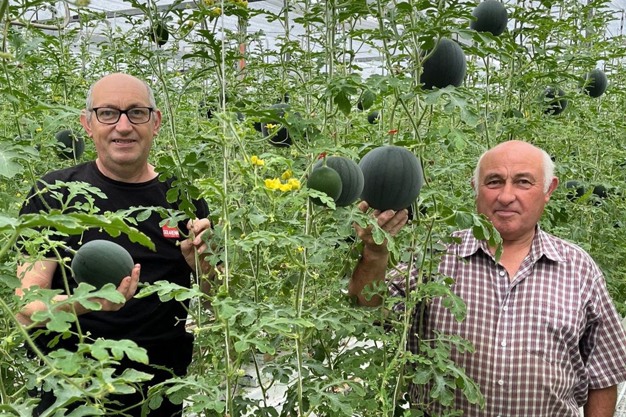Solarenn, the French cooperative based in Brittany, has been marketing mini watermelons since 2023. 15 to 20 tons are planned for this season, but production is set to increase over the next few years. Gaëtan Beraud, technical coordinator at the cooperative, explains the benefits of the product for both producers and consumers.
"Perfecting the growing model before expanding production"
After some promising tests in 2022, Jean-Yves and Patrick Rauflet from Livré GAEC (in Ille-et-Vilaine) launched production of the mini watermelon in 2023. Now produced on 2,000 m², it is entering its second year on the market. "Harvesting began in May (earlier than in open fields, thanks to cultivation in an unheated greenhouse) and the product should be on the shelves until mid-September," explains Gaëtan Beraud.
 Solarenn mini watermelons are sold in supermarkets in Brittany, close to the cooperative, and also by wholesalers in the region, Ile-de-France and Pays-de-la-Loire / © Solarenn
Solarenn mini watermelons are sold in supermarkets in Brittany, close to the cooperative, and also by wholesalers in the region, Ile-de-France and Pays-de-la-Loire / © Solarenn
Although an increase in acreage is planned for next year, the priority for the moment is to "perfect the cultivation model. We prefer to ensure product quality and optimize yields and quality before expanding production," explains Gaëtan. "In our production model, we make sure that we pick the watermelons when they are ripe. Tests are carried out every week before harvesting to ensure internal quality and optimum ripeness."
Sweeter and more practical
With a weight of 600g to 1 kg (compared with an average of 4 kg for a classic watermelon), the mini watermelon has a more pronounced taste and aroma than the classic one, but it is especially popular for its format. "It is clearly the product's main attraction these days," confirms Gaëtan. It is certainly sweeter (8° Brix minimum) and crunchier, and consumers appreciate the fact that a product like this is of French origin. But above all, it has a very practical format that makes all the difference. Normally, supermarkets sell portions of cut watermelon developed mainly for small households. "For these households, the mini watermelon is ideal, as it has a better shelf life."
Why mini watermelons?
While a number of French producers have launched mini watermelons in open fields, Solarenn wanted to rehabilitate existing greenhouses. "We were looking for a product that could be grown in greenhouses, but without any additional investment for the grower, and we had some old tomato greenhouses that were not being used. Several possibilities were discussed, and this was one of them."
For more information:
Solarenn
[email protected]
